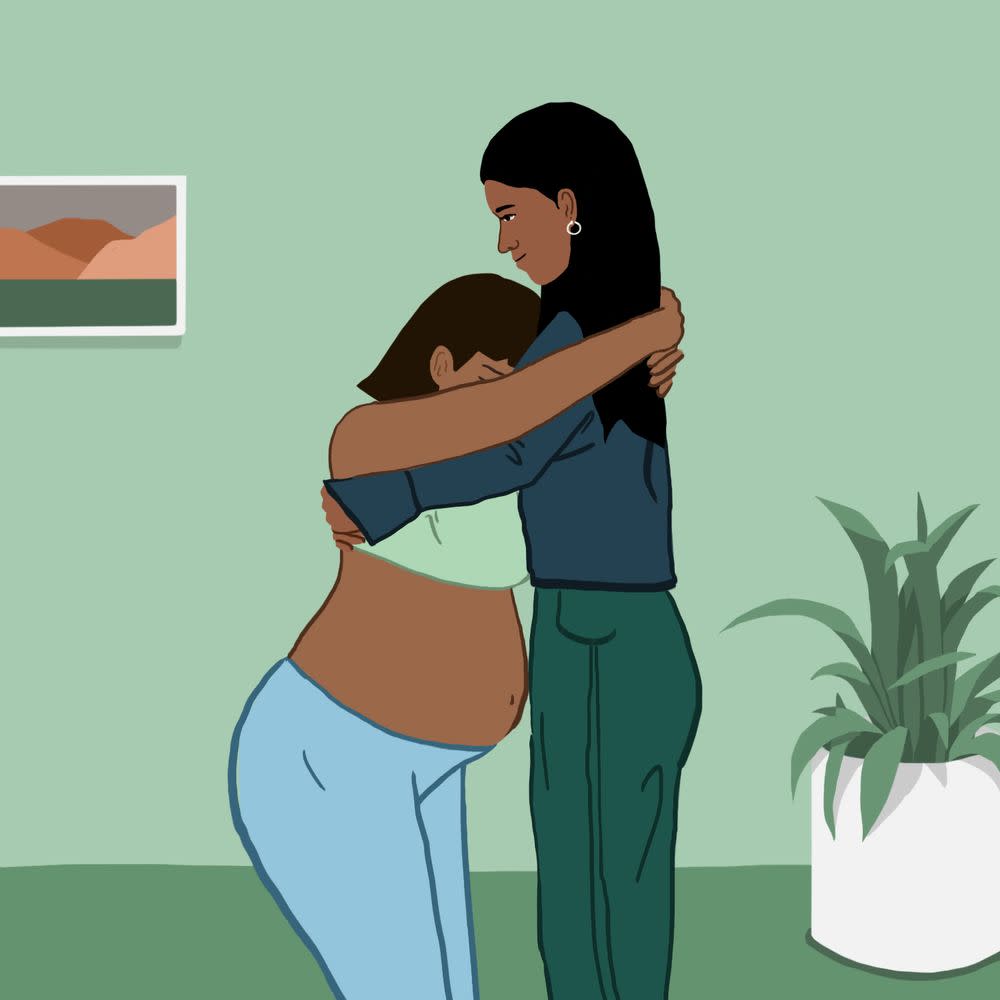Do Black Women Need Doulas More Than Anyone?

When Deanna Bobbi, a 30-year-old black mom from Baltimore, Maryland, recently gave birth to her now seven-week-old baby girl, she had a doula by her side. Early in her pregnancy Bobbi knew nothing about doulas, or if one could support her in her journey.
"I, like many others, stumbled upon the recent overwhelming reports of complications that women of color were having during pregnancy, the birthing process, and after delivery and I got scared," Bobbi said. "Many women who had made it through the complication or avoided them all together credited it to the support and advocacy their doula provided on their behalf. From there I was sold."
Bobbi believes the popularity of doulas within the black community is directly proportional to the lack of support that black women feel they are receiving from trained medical professionals.
"We need advocacy, we need support, and we need understanding because I truly believe our voices are not heard by our doctors," she said. "Before being diagnosed with preeclampsia, I had mentioned multiple times to my doctor about my worries around it and the symptoms I had that seemed to mimic it, but I was constantly dismissed...then wound up with it. I feel if I would have hired my doula earlier—one who could have helped me to speak up in the early stages—maybe things could have been avoided."

The term "doula" was first coined by medical anthropologist Dana Louise Raphael, Ph.D., who believed nonmedical caregivers could "mother the mother," assisting during and after delivery. Today doulas offer continuous support during the entire length of labor and beyond, compared to doctors and midwives who may not be as accessible or present.
"Giving birth can be quite daunting—from being in a weird environment to people trying to explain things to you in medical terms that you have never heard, to signing papers, and agreeing to treatment that you don't understand," explained obstetrician, gynecologist, and mother of two Lakeisha Richardson, F.A.C.O.G. "When a doula and a physician are working in sync to provide both the best care and the best experience for the patient, mothers get to experience childbirth as it was meant to be."
Culturally speaking, black women have always had companions with no medical training, like mothers and aunts, providing emotional support and comfort during pregnancy. There is even a collection of photos from 1951 currently on display at the Smithsonian National Museum of African American History and Culture featuring what would be classified now as black female doulas.
"Doulas are particularly important for women who have trouble questioning authority or find themselves deferring in situations even though they may not want to," said Joy Harden Bradford, Ph.D., a licensed psychologist, host of the Therapy for Black Girls podcast, and mother of two. "A doula can be a go-between and help to make sure that a woman's needs are asserted."
Latham Thomas, a two-time best-selling author and the founder of Mama Glow, a lifestyle brand and highly regarded website and women's center in Brooklyn, NY, has been working in women's health since 2006 and was inspired to become a doula after her own birth experience with her son Fulano.
Latham believes all women could use the support of doulas during birth, however, due to racial bias in the medical system; marginalized women have a greater need. She feels having a doula advocating for the black mom in the labor and delivery process would save more black women from dying in childbirth or experiencing complications shortly after that.
"Since black women are four times more likely than white women to die during childbirth or due to childbirth-related causes, having the support of a doula can prepare a family for some of the challenges they may experience as people of color."
New mom Kristian Henderson, Ph.D, hoped to use a doula for her pregnancy, but financial barriers prohibited it from happening. "I always imagined that I would use a doula, but I didn't realize that most insurance plans do not cover doula costs," said Dr. Henderson, 31, who is in her third trimester of pregnancy and plans to give birth at home with a midwife. "We need a policy change that makes doula support a covered birth expense so that more women can reap the benefits of having a strong support system throughout pregnancy and during birth. This is paramount for black women, especially, to ensure our survival."
According to The Washington Post, the cost of a doula can range from $400 to $3,500 out of pocket for a delivery. This can be especially troublesome for new black mothers since these women make 14 cents less on the dollar than white women and 30% of them are the primary breadwinners in their homes (as compared to 19% of all millennial moms). Some insurance companies will reimburse you for the cost of a doula, so it can be worth a call to learn what your benefits plan includes.
RELATED: How Much Do Doulas Cost?
While three states (Oregon, Minnesota, and New York) require Medicaid to reimburse for certified doula services and some urban areas including Brooklyn, Philadelphia, Baltimore, and Portland provide community doula services to low-income and at-risk women to help drive down infant mortality and provide maternal support, there is still more to be done on a national level to help black women through pregnancy, labor, and delivery.
Last year California senator and new presidential hopeful Kamala Harris and 13 other colleagues introduced the Maternal Care Access and Reducing Emergencies (CARE) Act, a bill to reduce the racial disparities in maternal mortality and morbidity. When thinking of black women and their use of doulas, Senator Harris believes there is indeed a public health crisis happening in the US and we must address it immediately.
"We need to speak the uncomfortable truth that women—and especially black women—are too often not listened to or taken seriously by the health care system, and therefore they are denied the dignity that they deserve," Senator Harris said. "And we need to speak this truth because today, the United States is 1 of only 13 countries in the world where the rate of maternal mortality is worse than it was 25 years ago. That risk is even higher for black women, who are 3 to 4 times more likely than white women to die from pregnancy-related causes. These numbers are simply outrageous."

From government programs to neighborhood nonprofits, a variety of resources do still exist for the population of black moms who were unable to use or do not plan to use a doula. Many black mothers are applying lessons learned from their personal experiences, serving as advocates for their fellow new moms.
Briara Lowery, 24, is the founder of Melanin Mommies, a Philadelphia nonprofit and safe space for pregnant and new moms. Lowery started noticing many of the moms she worked with were suffering from postpartum depression, which prompted her to create the Diapers and Depression project where moms share their experiences with PPD. She hoped it would open the door for healing and conversation among black women.
"It's very disheartening to know that our voices are not heard and when being vocal about our ailments we are being passively dismissed. It is killing us; there is no way to sugarcoat it," Lowery said. "Although I'm no physician, I am a person who can communicate when something is amiss with my body. As can every other black and brown mother. The key is for physicians to listen."
Until there is racial equity for black mothers, doulas—when they are accessible—are an additional layer of advocacy filling a void missing in today's healthcare. In some cases, doulas are relieving some of the stressors that have a direct impact on the health of a fetus. They are supporting the government and medical practices to reduce postpartum depression and infant mortality, and thus saving black lives.

